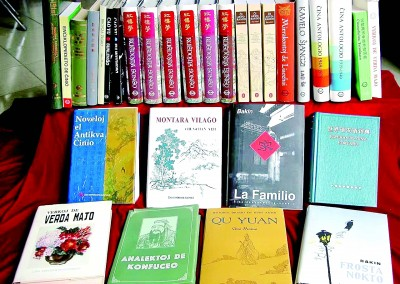Bridge of words: Esperanto deepens understanding among civilizations
"On a neutral language basis, understanding one another, the people make in agreement one great homeland." These inspiring lyrics from an Esperanto poem titled "The Hope" were sung by over 100 Esperanto speakers from around China at the 14th China Esperanto Congress held in Beijing on March 25.
Organized by the China Esperanto League (CEL), the meeting aimed to gather ideas from Chinese Esperanto speakers for future development, and take Esperanto work to new heights. During the meeting, a new CEL council and standing council were elected.

Esperanto books published in China [File photo]
Remaining devoted to the goal
The Esperanto poem was written by Polish doctor L. L. Zamenhof, who founded the Esperanto language with the hope of promoting world peace and fostering friendship and understanding among nations.
Over the past six decades, China Report magazine and CEL under China International Communications Group (CICG) have been responsible for the promotion, publication, and education of Esperanto, thereby helping the world to gain a better understanding of China through the language. To date, China Report has been distributed to 156 countries and regions, forming deep friendships with readers from all over the world.
Newly elected CEL President Liu Dawei, also vice president of CICG, emphasized in his speech that, at a new historical point, CEL has greater commitments to meet. He urged concerted efforts to remain devoted to the goals of the Esperanto work and explore new ways to bring the development of CEL to a new level.
Passing down the legacy
There have been many outstanding figures in the history of the Esperanto movement in China, whose remarkable talent, dedication to work, and noble characters are highly respected and worthy of emulation, said Wang Danhui, vice president of CEL. She called on the newly elected CEL council to gather more talent and play a more crucial role in promoting Chinese culture and deepening mutual learning among civilizations.
Li Shijun, born in 1923, was one of the predecessors who dedicated his life to promoting Esperanto in China. He translated three significant Chinese classics into Esperanto, namely "Outlaws of the Marsh," "Three Kingdoms," and "Journey to the West." His unremitting efforts in Esperanto translation earned him the academician title with the International Esperanto Academy. Li was the first Chinese to enter this academic circle.
Friends across the oceans
Tan Xiuzhu, former president of CEL and a member of the executive committee of the Universal Esperanto Association, has been devoted to Esperanto work for five decades. After graduating in 1965, she joined China Report magazine to work on Esperanto and made many friends in the Esperanto community worldwide.
In May 2003, Tan received a letter from an elderly German reader of China Report. In the letter, the German reader expressed his gratitude for Tan Xiuzhu's work at the magazine over the years, and he eventually donated 2,000 euros to CEL.
In the 1980s, an elderly reader from Belgium who was a long-time subscriber of China Report generously donated all his life savings worth $500,000 to the magazine for the development of Esperanto work.
In 1952, a cultural delegation from Iceland visited China and became the forerunner in cultural exchange between two countries. The visit was organized by a group of Icelandic Esperanto speakers who sought to learn more about China after reading China Report.
In recent years, CEL has fostered productive collaborations with international organizations such as UNESCO and the Universal Esperanto Association, as well as Esperanto associations in more than 10 countries including Japan, the Republic of Korea, Iran, Italy, and Brazil. In addition, entrusted by UNESCO, CEL has edited, translated, and published the Esperanto version of Courier, UNESCO's flagship magazine, for three consecutive years.
At the meeting, Liu also voiced his hope for the future of CEL. He called upon Esperanto speakers to adopt a global perspective and further strengthen exchange and cooperation with international Esperanto organizations.

